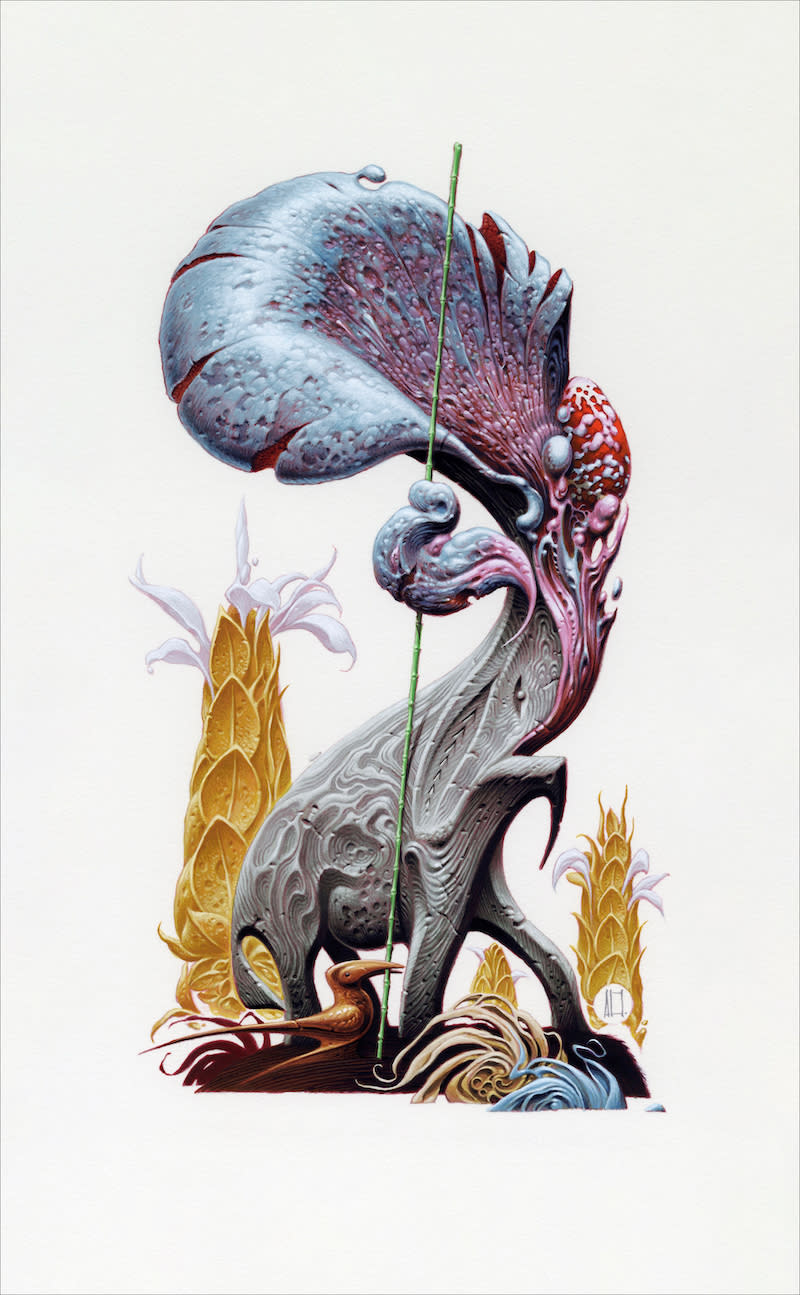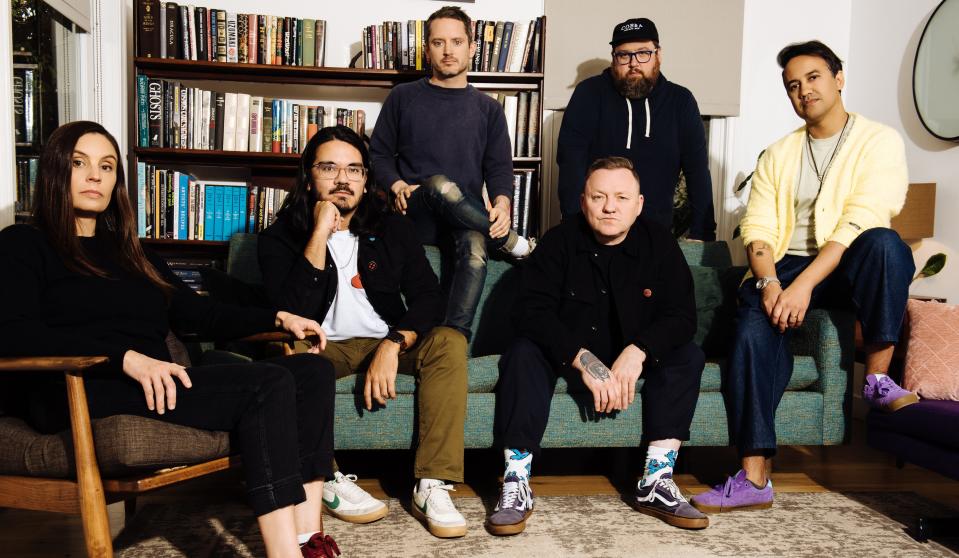Elijah Wood, Daniel Noah Discuss How Mutant, SpectreVision’s Poster and Vinyl Venture, Will Reinvent the Collectibles Market (EXCLUSIVE)
- Oops!Something went wrong.Please try again later.

Established in 2004, Mondo forever changed the landscape of pop culture collectibles — from t-shirts to screen printed movie posters, vinyl soundtracks, toys, board games and even home goods, the company elevated fandom from a hobby to a lifestyle. It has not only inspired dozens of similar businesses worldwide and propelled the consumption of physical media, but minted a team that quickly and widely became known for its passion, creativity and shrewd decisionmaking. On Monday, four of their former leaders — led by Eric Garza, Mitch Putnam, Spencer Hickman and Mo Shafeek — debuted a new endeavor leveraging their experience, relationships and reputation: Mutant.
Led by CEO Jenny Jacobi, a Vidiots Foundation advisory board member and seven-year Alamo Drafthouse veteran, the quartet will produce posters, music, apparel and more. The announcement them a chance to start fresh after exiting Mondo, now under the ownership of vinyl figurine company Funko Inc.
More from Variety
Elijah Wood and Daniel Noah to Launch Art and Collectibles Venture Mutant with Former Mondo Founders
“The industry’s approach to posters has changed because of what these guys have done and the artists that they work with,” actor Elijah Wood tells Variety. He should know; his and his company SpectreVision’s work has been immortalized multiple times over via Mondo’s art prints and soundtrack releases, which include “Cooties,” “A Girl Walks Home Alone at Night” and “Maniac.”

Unfortunately like many other businesses, Mondo’s original parent company, Austin, Texas based theater chain the Alamo Drafthouse, faced pandemic-related hardships leading to a March 2021 Chapter 11 bankruptcy filing and the June 2022 sale to Funko. Subsequent layoffs of senior creative director Garza and Mondo co-founders Putnam and Rob Jones in March 2023 led to Hickman, Shafeek and Shannon Smith tendering their resignations in June 2023, prompting fiercely loyal longtime collectors — and importantly, collaborating artists — to announce the death of the brand, at least in its original incarnation.
As Mondo continued to move forward with business expansion plans that included investing in a 70,000-square-foot vinyl pressing plant and events space in San Diego, industry supporters such as Wood and his SpectreVision co-founder Daniel Noah, Talon Entertainment financier Steven Demmler, and Alamo Drafthouse founder and board executive chairman Tim League reached out privately to the former Mondo creatives with an opportunity to begin their creative paths anew.
Despite their shared pedigree in the collectibles space, Putnam says that undertaking a new venture together was anything but a no-brainer. “I think all of our thoughts were, ‘Is this something I want to keep doing?’” he recalls.
Though League wasn’t in a position to protect the individuals from Funko leadership at the time they were ousted, he quickly assumed responsibility for shepherding them to the next chapter of their careers. “My overarching concern was finding a good landing spot for them,” he says. Wood was already among the first high-profile individuals to share their support on social media — not just a generous gesture but a reflection of the confidence he and Noah would place in them as Mutant came together. “We’re fans first, so it felt personal when the thing that happened to them happened,” says Daniel Noah.
It was the work these four and their associates did — both creatively and commercially — that made Mondo attractive to Funko; by the time of the company’s acquisition, they’d successfully forged licensing deals with many of the biggest (and most carefully controlling) individuals and brands in entertainment, from Disney and Lucasfilm to Tom Cruise and Stanley Kubrick. In preliminary conversations about a new vebture, SpectreVision stressed that it wanted to support their vision, not simply to sell it. “It became clear that there were impulses that they hadn’t yet realized to take the work that they had done and go beyond it,” Wood says.
One medium Garza hopes to explore in more depth at Mutant is anime/ manga. After spending years helping facilitate what has become a thriving ecosystem for collectors, they recognize that the biggest challenge they face will be differentiating themselves from their competition. “Whether it’s collectors or clients, our main goal is providing them with the best artwork and the best artist match that we can,” Putnam adds.

Garza and Putnam further indicate that they aren’t trying to reinvent the wheel (“in this point in the scene, best practices have kind of been sussed out,” says Putnam), although the company’s first release is, for the Mondo vets, atypical: an original, embossed, sculpted fine art print by Minnesota illustrator Aaron Horkey. With soundtracks for Warner Bros.’ “Wonka” and Netflix’s “Society of the Snow” on deck, Shafeek says that he and Hickman re-enter the collectibles landscape armed with lessons not just from their experiences at Mondo but as they watched vinyl consumption explode across all genres.
“There are an obsessive amount of variants coming out of a lot of the most recent big pop stars’ albums,” he observes. “Those aren’t necessarily bad, but for collectors, it is setting the weirdest expectations.”
After pioneering avant-garde packaging at Mondo on releases like “Autopsy of Jane Doe,” which came with a body bag and required listeners to crack open art of a chest cavity in order to access the record, Hickman and Shafeek plan to implement a broad spectrum of initiatives, both operational and philosophical. Those include a focus on more sustainable materials and processes for the vinyl and packaging, as well as forays into “the non-soundtrack space” and more experiential endeavors like their coordination of a 2017 reunion screening in Los Angeles of “Josie and the Pussycats” featuring key members of the cast and crew.
Though Mutant is an arm of SpectreVision, Wood, Noah and League all emphasized that the business will operate as independently as possible. Wood says, “It was important that they stand on their own, that we are simply providing a platform for a relaunch of these individuals under their own new banner.” In fact, they say they’re thrilled to encourage the foursome to dream big and take risks without worrying about the company’s financial performance. “Insofar as we can be helpful, I’m super stoked to be able to collaborate, but also super stoked to keep hands off.”
It’s a corporate climate that Jacobi was eager to be a part of after watching too many companies pursue growth for growth’s sake. “We are going into this knowing that the priority will always be to do work that we are very passionate about,” she says. Though she won’t exercise the same sorts of creative muscles, Jacobi says she’ll complement them as part of the “collaborative engine” that forms the core of Mutant.
“I tend to be sort of risk-averse and conservative in my approach to things generally,” she explains, “which is probably why it’s a good fit for me to come into this and do this role. But we anticipate coming out of the gate strong and continuing to grow over time — however long that takes.”

Asked if any of them have ventures they’d personally like to see come to fruition, Wood says he’s “really excited” about developing an apparel line, while League would thrill at the chance to create large-format posters, a niche carved out for only the most wall-space advantaged. “But it’s not a mandate, guys,” League adds. “That’s just like an idea. If you like it, then great.” As with Horkey’s fine art print, Jacobi looks forward to giving their clients and collaborators a platform for work that’s unencumbered by the restrictions and responsibilities of intellectual property, much less traditional formatting.
“Like composers who may have an album that they’re putting out totally independent of any studio or soundtrack,” she says. Unsurprisingly, the team’s past work offers a helpful precedent for this sort of endeavor: in 2020, “Up” Oscar-winner Michael Giacchino released the lounge music-themed original composition “Travelogue Vol. 1,” via Hickman’s Mondo imprint Death Waltz Originals.
Meanwhile, as League embarks on a second iteration of the business model he pioneered with Mondo, he says he hopes to apply some of the lessons he learned on the first, both bad and good. “I’ve had times where I’ve been too hungry and just charged ahead — ‘we’ll figure it out later’,” he remembers. “That’s not really the mode here.”
Emboldened by the support they’ve received so far, Garza and Putnam suggest that Mutant feels less like a new beginning than simply a new chapter in their careers. “The opportunity to stick together and continue doing this work that we do was a big factor in us saying, yes, I do want to keep doing this,” says Garza.
“It was the response of the community, actually, that really drove home why we do this,” adds Putnam. ‘The artists, the people that collect our work, the studios, all of our friends made it clear how important it was to them, and it really gave us a feeling of purpose.”
Best of Variety
'House of the Dragon': Every Character and What You Need to Know About the 'Game of Thrones' Prequel
25 Groundbreaking Female Directors: From Alice Guy to Chloé Zhao
Sign up for Variety’s Newsletter. For the latest news, follow us on Facebook, Twitter, and Instagram.

